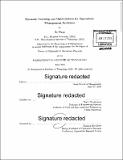Dynamic learning and optimization for operations management problems
Author(s)
Wang, He
DownloadFull printable version (8.355Mb)
Other Contributors
Massachusetts Institute of Technology. Operations Research Center.
Advisor
David Simchi-Levi.
Terms of use
Metadata
Show full item recordAbstract
With the advances in information technology and the increased availability of data, new approaches that integrate learning and decision making have emerged in operations management. The learning-and-optimizing approaches can be used when the decision maker is faced with incomplete information in a dynamic environment. We first consider a network revenue management problem where a retailer aims to maximize revenue from multiple products with limited inventory constraints. The retailer does not know the exact demand distribution at each price and must learn the distribution from sales data. We propose a dynamic learning and pricing algorithm, which builds upon the Thompson sampling algorithm used for multi-armed bandit problems by incorporating inventory constraints. Our algorithm proves to have both strong theoretical performance guarantees as well as promising numerical performance results when compared to other algorithms developed for similar settings. We next consider a dynamic pricing problem for a single product where the demand curve is not known a priori. Motivated by business constraints that prevent sellers from conducting extensive price experimentation, we assume a model where the seller is allowed to make a bounded number of price changes during the selling period. We propose a pricing policy that incurs the smallest possible regret up to a constant factor. In addition to the theoretical results, we describe an implementation at Groupon, a large e-commerce marketplace for daily deals. The field study shows significant impact on revenue and bookings. Finally, we study a supply chain risk management problem. We propose a hybrid strategy that uses both process flexibility and inventory to mitigate risks. The interplay between process flexibility and inventory is modeled as a two-stage robust optimization problem: In the first stage, the firm allocates inventory, and in the second stage, after disruption strikes, the firm schedules its production using process flexibility to minimize demand shortage. By taking advantage of the structure of the second stage problem, we develop a delayed constraint generation algorithm that can efficiently solve the two-stage robust optimization problem. Our analysis of this model provides important insights regarding the impact of process flexibility on total inventory level and inventory allocation pattern.
Description
Thesis: Ph. D., Massachusetts Institute of Technology, Sloan School of Management, Operations Research Center, 2016. Cataloged from PDF version of thesis. Includes bibliographical references (pages 153-157).
Date issued
2016Department
Massachusetts Institute of Technology. Operations Research Center; Sloan School of ManagementPublisher
Massachusetts Institute of Technology
Keywords
Operations Research Center.